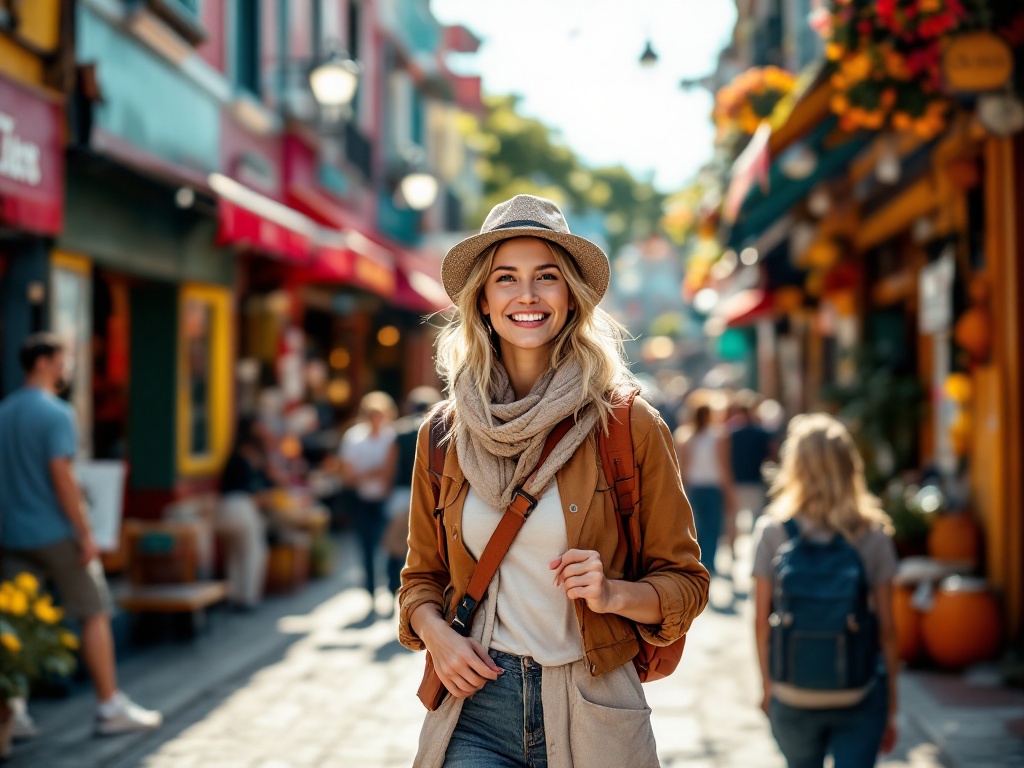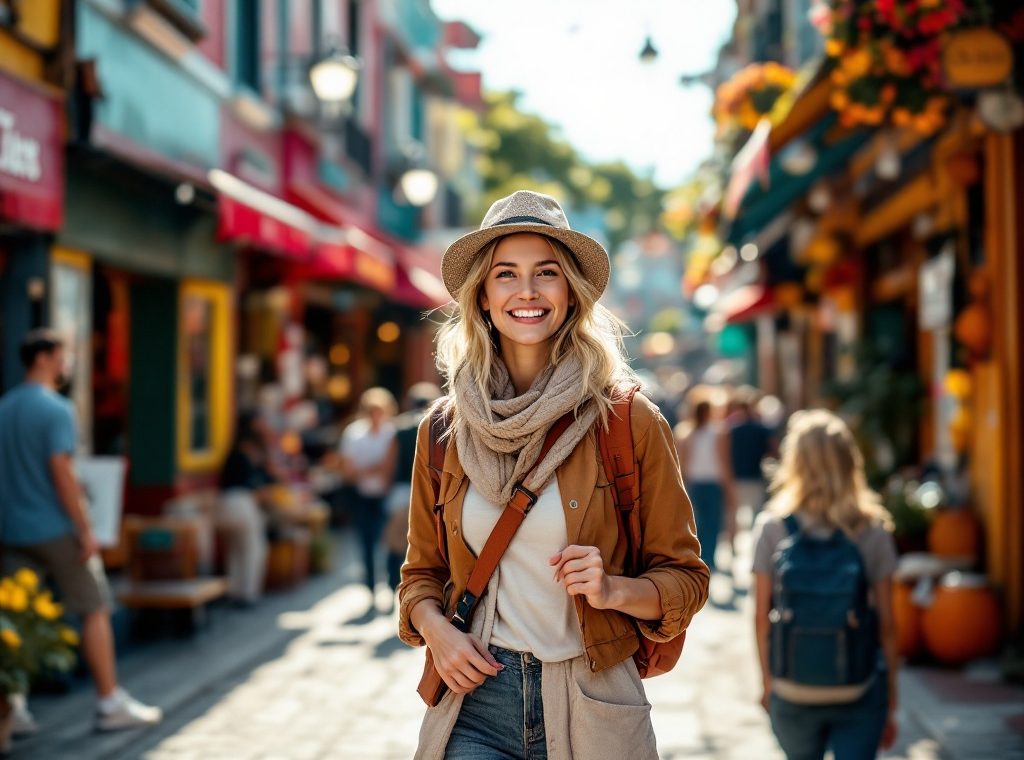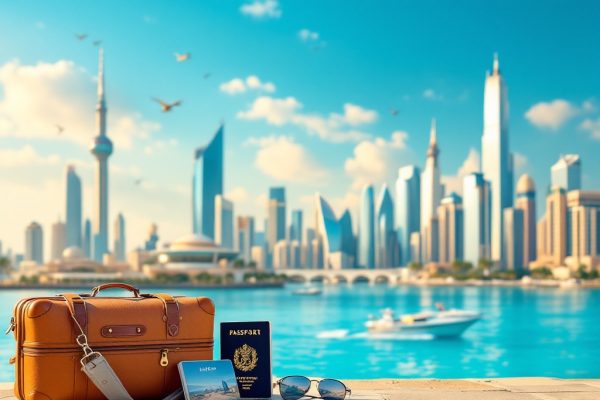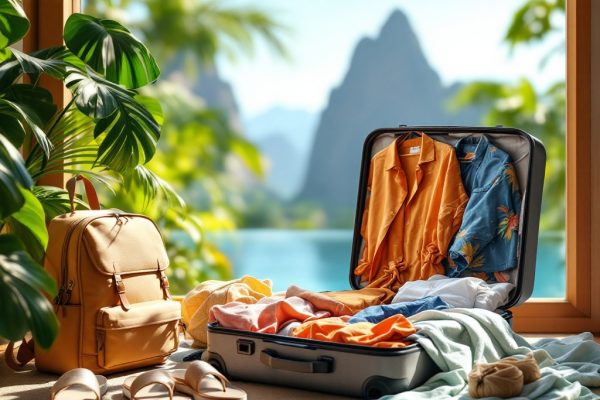How to Stay Safe While Traveling Solo
Dreaming of a solo adventure? Explore the world with confidence! This guide provides essential safety tips for solo travelers, from pre-trip planning to on-the-ground strategies. Learn how to research your destination, secure safe accommodations, and choose reliable transportation. Discover practical advice on protecting your belongings, staying aware of your surroundings, and socializing safely. Empower yourself with emergency preparedness tips and resources specifically for solo female travelers. Start your journey safely and confidently – read on to learn more.
Important information

- Research your destination thoroughly: Learn about local customs, laws, safety concerns, and transportation options. Identify safe neighborhoods and potential risks like scams.
- Share your itinerary with family or friends and check in regularly so they know your whereabouts.
- Protect your belongings: Be mindful of your surroundings, especially in crowded areas. Consider using anti-theft bags, money belts, and hotel safes.
- Have a backup plan: Prepare emergency contacts, local emergency numbers, and copies of important documents. Get travel insurance for medical emergencies, cancellations, and lost luggage.
- Choose safe accommodations: Look for reputable establishments with good security measures and positive reviews.
Understanding Solo Travel Safety
Traveling solo offers incredible freedom, but safety should always be your top priority. Before your trip, research your destination thoroughly, learning about local customs, laws, and any potential safety issues. Trust your instincts and if something feels off, remove yourself from the situation. Share your itinerary with family or friends and check in regularly so they know your whereabouts. Protecting your belongings is essential. Be mindful of your surroundings, particularly in crowded places, and consider using anti-theft bags or money belts. Research safe neighborhoods and choose reliable transportation. Always have a backup plan, including emergency contacts and local emergency numbers. If you ever feel unsafe, don’t hesitate to contact local authorities or your accommodation staff. Choose your accommodations carefully, looking for places with positive reviews and good security measures for added peace of mind.
Research your destination, including local customs, laws, and safety concerns.
Share your itinerary with family or friends and check in regularly.
Protect your belongings. Be aware of your surroundings and consider anti-theft measures.
Have a backup plan. Prepare emergency contacts and local emergency numbers.
Choose safe accommodations. Prioritize places with positive reviews and good security.
The Importance of Traveling Safely Alone
Solo travel offers exciting freedom, but safety should always be a top priority. Traveling alone can make you more vulnerable, so heightened awareness of your surroundings is essential. Secure your valuables carefully and research your destination thoroughly before you go. These precautions contribute significantly to a safe and enjoyable trip.
Accommodation
Your accommodation choices play a vital role in your safety. opt for well-reviewed hotels or rentals with robust security features in safe locations. This will significantly enhance your peace of mind.
Safety Tips for Solo Travelers
- Be aware of your surroundings, especially in crowded areas or at night.
- Secure your valuables in a safe or hotel locker.
- Research your destination thoroughly, including local customs and laws.
- Share your itinerary with someone at home.
- Stay in well-lit and populated areas.
Why Solo Travelers Need Special Attention to Safety
Solo travel offers incredible freedom, but prioritizing safety is essential for a positive experience. Being alone, especially for women, can increase vulnerability to theft or harassment. Be vigilant and aware of your surroundings. Avoid walking alone at night in unfamiliar areas. Share your itinerary with a trusted friend or family member. This ensures someone knows your plans and can act if necessary. Enjoy your solo adventure, but always prioritize your well-being.
Preparing for Your Solo Adventure
Research your destination thoroughly. Familiarize yourself with local customs, laws, and potential safety concerns. This will allow you to make informed decisions about your itinerary and activities, ensuring a safe and enjoyable experience.
Secure safe accommodations. Book your stay in reputable establishments, considering factors like location, reviews, and security measures. A comfortable and secure stay significantly enhances any trip.
Evaluate transportation options. Prioritize safety, reliability, convenience, and cost when comparing bus routes, train lines, or other transportation methods. This ensures worry-free travel.
Get travel insurance. Travel insurance is crucial for unforeseen events like medical emergencies, lost luggage, or cancellations. It provides invaluable peace of mind.
Prepare an emergency plan. Include contact information for local emergency services, your embassy, and family or friends. This acts as a vital safety net in unexpected situations.
Share your itinerary. Provide your travel plans to a trusted contact who can monitor your trip, adding an extra layer of security.
Researching Your Destination
Thorough research is crucial for a safe and enriching solo trip. Learning about your destination, including local customs and laws, not only enhances your safety but also allows for deeper cultural immersion. Identify potential risks like common scams or unsafe areas. While embracing the local culture, always remain aware of your surroundings. Here’s a breakdown of essential steps for planning your solo adventure:
Research your destination thoroughly. Learn about local customs, laws, and cultural norms. This knowledge will not only enhance your safety but also enrich your travel experience.
Identify potential risks. Research common scams, unsafe areas, and any potential health hazards. Being aware of these risks will allow you to take necessary precautions.
Embrace the local culture while staying aware. Immerse yourself in the local culture while remaining mindful of your surroundings. Be cautious of your belongings and avoid displaying excessive wealth.
Planning Your Accommodation
Prioritizing safety is key when selecting solo accommodations. Look for hotels or hostels with strong security measures, such as 24-hour reception, secure entry systems, and in-room safes, instead of shared spaces. Choose establishments with positive safety reviews, located in well-lit and safe neighborhoods.
Choosing Safe Transport Options
Prioritize safe transportation by using reputable taxi services or ride-sharing apps with built-in safety features.
Pre-book your airport transfer for added peace of mind.
Whenever possible, schedule your arrival during daylight hours.
Familiarize yourself with local transport options, including routes and schedules, to simplify your travel.
Travel Insurance Considerations
Traveling alone? Travel insurance is essential for protecting your finances against unexpected events like trip cancellations, medical emergencies, and lost luggage. Thoroughly review your policy to ensure it meets your specific needs. Should an emergency arise, stay calm and contact local emergency services if needed. Keep essential contact information readily available, including local emergency numbers and your embassy’s contact details. Prior research into local customs and emergency procedures is also recommended. For solo travelers, travel insurance with emergency assistance provides invaluable support and peace of mind – a crucial safety net worth investing in. Here’s why you should consider it:
Financial Protection
Travel insurance safeguards your finances against unforeseen circumstances. Trip cancellations due to illness or unforeseen events can be costly. Medical emergencies abroad can lead to exorbitant medical bills. Lost or stolen luggage can disrupt your trip and incur replacement expenses. Travel insurance helps mitigate these financial risks, providing reimbursement for covered expenses.
Peace of Mind
Knowing you have a safety net allows you to fully enjoy your solo adventure. 24/7 emergency assistance provides support and guidance when you need it most, whether it’s medical assistance, arranging transportation, or replacing lost documents. This support is invaluable, especially when navigating unfamiliar environments and situations alone.
Research and Choose the Right Policy
Evaluate your needs and compare different travel insurance policies. Look for coverage that aligns with your itinerary and potential risks. Pay attention to coverage limits, exclusions, and benefits such as medical evacuation and repatriation.
Keep Essential Information Accessible
Store your policy details, emergency contact numbers, and embassy information in a secure yet easily accessible place. Consider both digital and physical copies. Inform a trusted contact back home about your itinerary and insurance details.
Familiarize Yourself with Local Procedures
Research local customs, emergency numbers, and basic first-aid procedures. Understanding the local context can be invaluable in a crisis. Download relevant apps or save important websites for offline access.
Creating an Emergency Plan
Before traveling, prioritize emergency preparedness. Compile essential local emergency numbers, your embassy or consulate’s contact details, and designate an emergency contact back home, keeping them informed of your itinerary. Store copies of important documents, like your passport and travel insurance, separately from the originals. A fully charged phone is crucial; save emergency contacts and download helpful safety apps that offer navigation, alerts, and real-time information. These precautions will significantly contribute to a safe and secure trip.
Gather essential contact information. Compile local emergency numbers, your embassy’s or consulate’s contact information, and a designated emergency contact back home. Keep your emergency contact updated on your travel plans.
Safeguard copies of vital documents. Store copies of your passport and travel insurance separately from the originals.
Ensure your phone is prepared. Keep your phone fully charged. Store emergency contacts in your phone. Download safety apps offering navigation, alerts, and real-time information.
Staying Connected: Share Your Itinerary
Share your trip details with a trusted contact, including flights, accommodations, and planned activities. Regularly check in with them, providing location updates and any itinerary changes. This enhances your safety.
Safety Strategies While Traveling Solo
Prioritize safe accommodations by selecting reputable hotels or hostels with positive safety reviews. Look for features like 24-hour security and well-lit entrances. Utilize in-room safes or lockers for your valuables, especially your passport and electronics.
For safe travels, opt for reputable taxis or ride-sharing services, particularly at night. Research public transport routes and schedules beforehand. Avoid walking alone, especially in poorly lit or isolated areas. Exercise extra caution after dark. Pre-booked airport transfers can offer an additional layer of security.
Stay aware of your surroundings and minimize distractions. Avoid using your phone while navigating unfamiliar areas. Trust your instincts; if a situation feels unsafe, remove yourself immediately.
When socializing, exercise caution and avoid oversharing personal information with strangers. Meet new acquaintances in public places like cafes or on group tours. Moderate your alcohol intake, as excessive drinking can cloud your judgment. Inform someone of your plans, including your destination and who you’re meeting.
Consider using safety devices such as personal alarms, door stops, or GPS trackers to enhance your security and provide peace of mind. A whistle can also be a valuable tool in emergencies.
Securing Your Accommodation
Upon arrival, inspect your room and ensure the door and windows lock securely. For added peace of mind, consider a portable door lock.
Choosing Safe Transportation Methods
Prioritize your safety during your travels by using official taxis or ride-sharing apps with enhanced safety features. When using public transport such as buses or trains, stay alert and aware of your surroundings. Keep your belongings secure and avoid isolated areas, especially at night. For a safer and more comfortable journey, consider traveling during off-peak hours to minimize crowds on public transport.
Maintaining Awareness of Your Surroundings
Be aware of your surroundings, observing both people and the environment.
Minimize distractions by putting away your phone.
Familiarize yourself with local customs to better understand typical behavior.
Walk with a confident purpose, avoiding aimless wandering.
Engage with locals for helpful safety tips, such as recommended safe routes and warnings about potential hazards.
Exercise caution when interacting with strangers.
Socializing Safely
Share your plans with someone you trust before meeting new people.
Trust your instincts. If a situation feels unsafe or uncomfortable, remove yourself immediately.
Be cautious about sharing personal information, especially details like where you’re staying.
Moderate your alcohol intake to stay alert and aware of your surroundings.
Consider joining group tours or guided activities. These offer a safe and social way to meet new people.
Using Safety Devices for Added Security
Personal alarms are an effective deterrent, adding a powerful layer of protection against threats. Portable door locks further enhance security, especially in hotels and other lodgings. Understanding their operation is crucial for significantly boosting your safety.
Night Safety and Public Places
Plan your routes strategically, sticking to well-lit streets and avoiding isolated areas. Research safe neighborhoods in advance and opt for secure transportation options. Always inform someone about your plans, including your destination and estimated return time.
Safeguard your valuables. Use a money belt or inside pockets for important items, and keep your bag close and in front of you at all times, especially in crowded areas. Avoid displaying expensive jewelry or electronics. Stay alert and watch out for distractions, a common tactic used by pickpockets. Consider using anti-theft bags with locks for extra security.
Project an air of confidence. Walk with purpose and maintain minimal eye contact with suspicious individuals. If approached, respond politely but firmly. If you feel threatened, seek a public area or assistance from a nearby business or authority immediately.
Blend in and respect local customs. Observe the local dress code and avoid flashy clothing or accessories that may identify you as a tourist. Researching local customs beforehand and learning basic greetings not only shows respect but can also prevent misunderstandings and enhance your safety. This makes you less of a target and enriches your travel experience.
Staying Safe When Out at Night
Nighttime safety is paramount. Avoid walking alone after dark, particularly in poorly lit or unfamiliar areas. When unavoidable, opt for well-lit and populated streets. Even in safer locations, remain vigilant. Minimize distractions, such as cell phone use, and stay aware of your surroundings. Walking with a friend offers an additional layer of security. Consider these precautions for enhanced safety:
- Avoid poorly lit or unfamiliar areas, especially after dark.
- Choose well-lit and populated routes whenever possible.
- Minimize distractions like cell phone use and stay alert.
- Walk with a friend or group for added safety.
Pickpocket Prevention Tactics
Safeguard your valuables by keeping them close in a money belt or a secure pouch. Stay vigilant, particularly in crowded areas. Avoid displaying expensive jewelry or electronics. Consider using anti-theft bags with locking zippers for added protection. When carrying any bag, keep it in front of you for increased security.
Use a money belt or secure pouch to keep your valuables close. This will make it more difficult for thieves to snatch them.
Be aware of your surroundings, especially in crowded areas. Thieves often target tourists in crowded places.
Avoid displaying expensive jewelry or electronics. These items can make you a target for thieves.
Consider using anti-theft bags with locking zippers. These bags can help to deter thieves.
When carrying any bag, keep it in front of you. This will make it more difficult for someone to grab it without you noticing.
Avoiding Unwanted Attention
Project confidence through your body language: maintain eye contact and walk with a determined stride.
Communicate assertively and directly when engaging with others.
Dress respectfully and be mindful of local customs.
Minimize risk by avoiding outward displays of wealth, such as expensive jewelry or electronics.
Prioritize your safety by staying aware of your surroundings and removing yourself from uncomfortable situations.
Blending In with Locals
Staying safe while traveling often depends on blending in. Before you go, research local customs to understand appropriate attire and behavior. Avoid flashy jewelry and clothing that might attract unwanted attention; instead, opt for attire similar to what locals wear. Observe and subtly adopt their mannerisms, such as greetings and queuing etiquette. Learning basic phrases like “hello” and “thank you” demonstrates respect and facilitates smoother interactions. These precautions not only reduce your risk but also enhance your travel experience. Here are some tips to help you blend in:
Research and Observe
Before your trip, thoroughly research the local customs and traditions of your destination. Observe how locals dress, interact with each other, and behave in public spaces. This will give you valuable insights into how to blend in seamlessly.
Dress Appropriately
Avoid wearing flashy jewelry or clothing that might draw unwanted attention. Opt for attire that is similar to what locals wear, respecting cultural norms and expectations. This will help you avoid standing out as a tourist.
Adopt Local Mannerisms
Pay attention to the subtle nuances of local behavior, such as greetings, queuing etiquette, and dining customs. Subtly adopting these mannerisms can help you integrate more effectively into the local environment.
Learn Basic Phrases
Learning basic phrases in the local language, such as “hello,” “thank you,” and “excuse me,” demonstrates respect and can greatly enhance your interactions with locals. It can also be helpful in navigating unfamiliar situations.
Emergency Preparedness
Identify and save local emergency contacts in your phone, including police, fire departments, and ambulance services.
Locate the nearest hospital to your accommodation.
Keep your phone fully charged to ensure it’s available during emergencies.
Consider learning basic self-defense techniques to boost your confidence and enhance your safety.
Knowing Local Emergency Contacts
When traveling alone, safety should be your top priority. Before embarking on your trip, take the following steps: save emergency contacts in your phone, including local police, fire, and ambulance services, as well as your embassy or consulate. Familiarize yourself with local emergency procedures. This preparation could be essential in a critical situation.
Keeping a Charged Phone with You
In emergencies, a charged phone is crucial; it’s your lifeline. Save local emergency contacts – you’ll be glad you did.
A portable charger offers essential backup power, a true lifesaver when your battery runs low. For travelers, a local SIM card can significantly boost connectivity.
Understanding Self-Defense Techniques
Enhance your travel safety with these self-defense tips. Learning basic self-defense moves can boost your confidence and prepare you for unexpected situations. Consider taking a self-defense class to learn effective techniques such as palm strikes, knee kicks, and grip escapes. Consistent practice will help you develop muscle memory, enabling you to react instinctively if needed. Carrying a personal safety alarm can also deter potential threats. Remember, however, that avoiding risky situations is the most effective self-defense strategy. If confronted, prioritize escaping over engaging in a physical altercation. Your safety is paramount.
Special Considerations for Female Solo Travelers
Solo female travel offers exciting adventures, but prioritizing safety is crucial. Trust your instincts; if a situation feels unsafe, remove yourself. Safety apps are invaluable tools, allowing you to share your location and send alerts to contacts. Researching local customs beforehand, especially dress codes, can minimize unwanted attention. Dressing modestly and respectfully often enhances your safety. Learning basic phrases in the local language can also improve communication and navigation. However, be cautious about sharing personal information like hotel details or travel plans with strangers. Staying alert and aware of your surroundings is key to a safer and more fulfilling solo trip.
Trust your gut feeling. If a situation feels unsafe, remove yourself immediately.
Utilize safety apps. These can help you share your location and send alerts to your emergency contacts.
Research local customs. Pay attention to dress codes to minimize unwanted attention.
Learn basic local phrases. This can improve communication and navigation.
Be cautious about sharing personal information. Avoid giving out details like your hotel or travel plans to strangers.
Facing Additional Risks
Solo female travel offers exciting opportunities but also requires vigilance. Understanding local customs is key, so research your destination thoroughly, including laws and cultural attitudes toward women. Identify and avoid high-crime areas, particularly at night.
Research your destination. Learn about local customs, laws, and cultural attitudes toward women.
Identify and avoid high-crime areas, especially at night.
Learn basic self-defense to boost your confidence and preparedness.
Carry a personal safety alarm to deter potential threats.
Share your itinerary with trusted contacts and check in regularly for added security.
Enjoy your adventures safely!
Trusting Your Instincts
If a situation feels unsafe, trust your instincts and remove yourself from it.
Stick to well-lit and populated areas.
Remember that shops and restaurants can offer a safe haven in a difficult situation.
Save local emergency numbers in your phone for easy access in emergencies.
Plan your route back to your accommodation in advance.
Using Safety Apps and Devices
Enhance your safety with personal safety apps and devices.
Personal Safety Apps
- Noonlight, bSafe, and SOS Global offer immediate assistance.
- Share your location with trusted contacts using Life360 and Find My Friends.
Personal Safety Devices
A personal safety alarm can deter threats.
Researching Local Customs and Dress Codes
Immerse yourself in the local culture by researching customs beforehand. Dressing respectfully, particularly for women traveling alone, minimizes unwanted attention and enhances safety by helping you blend in. Modest attire can prevent unwanted attention. Respecting local customs includes understanding social norms and learning basic phrases, which demonstrates respect for the local people.







